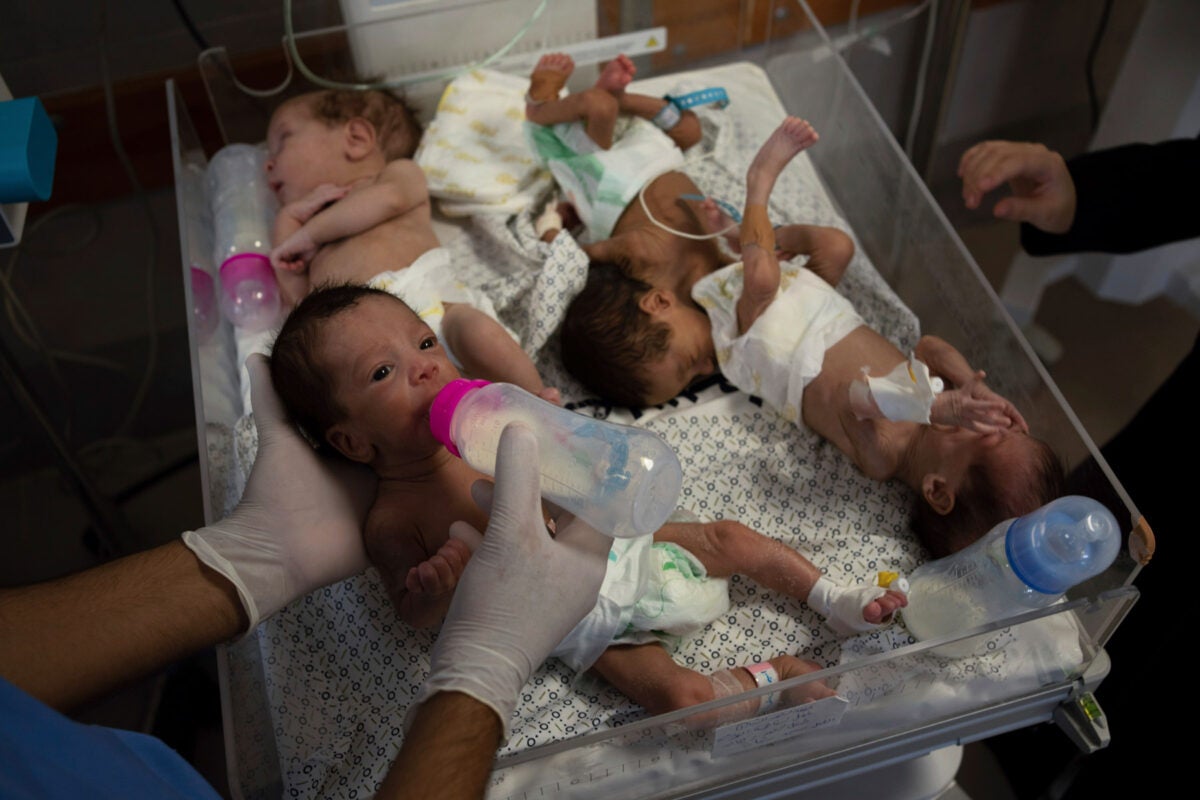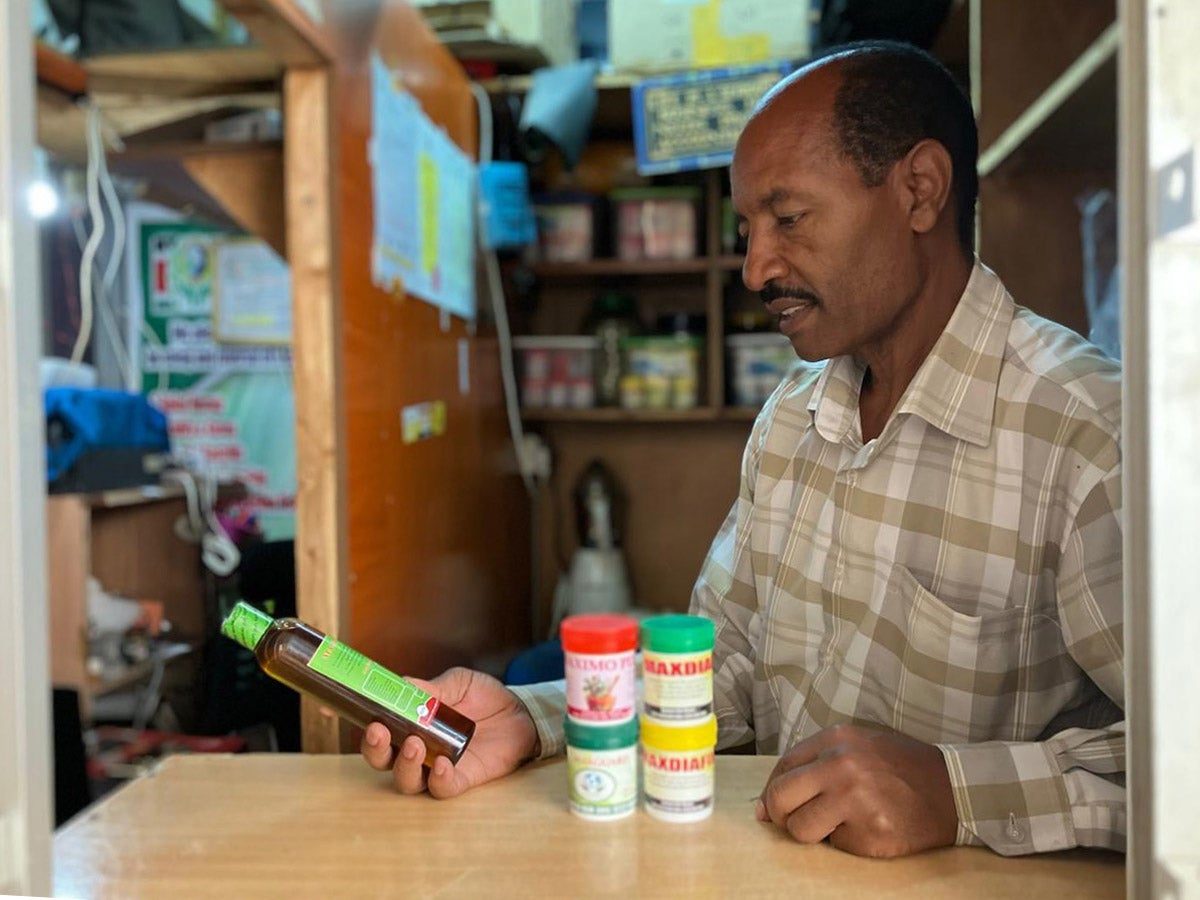
Feature
In Gaza, birth becomes a battlefield
In Gaza, where Israeli forces have been waging war since the October 7 attacks by Hamas, the number of dead goes up weekly. So does another figure, less often discussed: the number of babies being born into conflict.
There more than 50,000 pregnant women in Gaza—and 180 babies born every day; 5,500 in the last month—according to estimates from the United Nations.
Birth is always a challenging circumstance—but the challenges are extreme in Gaza, where hospitals are overwhelmed, supplies are dwindling, and water and sanitation infrastructure, which depends on electricity and fuel, has almost completely shut down.
All of this puts birthing women and their babies in Gaza at greater risk of infection, complications, and death, experts say.
Prior to and during the ceasefire, Harvard Public Health was able to communicate by text message and voice memo with two health care providers in Gaza. They offer a glimpse into what it’s like trying to bring babies into the world when hospitals are overwhelmed, medical transports are targets, and there are shortages of antibiotics and clean water.
Sign up for Harvard Public Health
Delivered to your inbox weekly.
The two health care providers, who are in southern Gaza, described shortages of electricity, water, medical supplies, equipment, blood, drugs, and staff. In the hospital where Nour, a medical student, volunteers, babies must share incubators. (HPH is not using her last name to protect her safety.) Omar al-Najjar, a doctor at a different hospital, has trouble finding bandages, sutures, and sterile gloves, even when he’s responding to traumas.
The lack of antibiotics raises the risk for infection. In wounds, for example, white flies and their larvae have been found, which UNOCHA says increases risk of tissue damage, bacterial infection, and blood poisoning.
“What we witness surpasses human understanding.”
Omar Al-Najjar, a health care provider in Gaza
Pregnant women, meanwhile, face hurdles just to reach the limited care available in health centers. Fuel shortages and damage from Israeli military activities have limited the number of available ambulances in Gaza.
“People have been literally making jokes about this,” Nour said. A friend who was nine months pregnant told her, “I have a list of numbers for animal carts, so when I get [into] labor, I’ll find them.”
These conditions make it more likely for pregnancies to become emergencies in Gaza, but doctors lack the usual tools for response. Last month, Omar witnessed a cesarean section performed without anesthesia. “The mother was literally dying, so it was necessary to try to save her baby” even if it meant operating too quickly for anesthesia, he said in a voice message. “The woman was sent to the ICU room, and I think she survived after many surgeries.”
Nour witnessed a similar situation with a more tragic outcome. Last month the hospital where she volunteers received a pregnant woman who was severely injured. She was taken to the operating room, where doctors performed a cesarean section, hoping at least to save the baby. The mother was bleeding from “almost everywhere,” Nour said. An IV could not be inserted, she added, making it impossible to give the woman anesthesia. The doctors successfully delivered the baby boy, but the mother died after the procedure. The baby’s father had already been killed.
Another patient brought to the hospital was declared dead on arrival, Nour said. But when physicians noticed a bloated abdomen, they did a cesarean section on the dead woman. The baby was alive, sent to an intensive care unit, and transferred to a different hospital in the southern part of Gaza.
The health workers said the psychological toll of what they’re doing is immense, for those both delivering and receiving health care in the crisis.
“To be honest, it’s bad, really bad. I’ve broken down more than once. What we witness surpasses human understanding,” wrote Omar. “Displaced people crowd the bathrooms. We receive one meal a day, sleeping on the ground, no sufficient mattress or blankets.”
Meanwhile, he worries for his families’ and friends’ safety. He described finding friends, colleagues, and teachers—injured or dead—in the ER during his shifts.
“I’ve treated people while trying to contact my family to ensure their safety,” he wrote.
More than 250 health workers have been killed in Gaza since the conflict began in October, according to the Palestinian health minister, Mai al-Kaila. WHO Director-General Tedros Adhanom Ghebreyesus said this week that only 14 of Gaza’s 36 hospitals “are even partially functional”—and in the heavily-hit northern region, there are only two. Hospitals across Gaza have lost more than half of their bed capacity, he said, a devastating blow to health care for the 2.3 million residents of the Gaza strip, which is only 25 miles long and, at its widest point, about seven miles across.
New cases of diarrhea and respiratory infections, meanwhile, are skyrocketing. These risks are common in conflict settings, but they can be deadly for new moms and babies. Infection risks are compounded by high stress levels among women surviving in an active war zone. Research strongly associates increases in stress with problems during pregnancy, such as preterm birth or preeclampsia.
In October, many of those women walked more than eight miles to flee the bombardment in the north, according to Sawsan Abdulrahim, an associate professor of public health at American University in Beirut. In November, doctors at Al-Shifa, Gaza’s biggest hospital and located in the heavily bombarded north, raised an alarm about 39 premature babies who could no longer be properly cared for, due to lack of power, oxygen, and water; eight died, and 31 were transferred out of Gaza, most of them onward to Egypt. And as of this week, midwives were providing limited services in eight operational health centers—one fewer than just a month ago—for high-risk pregnancies and post-natal care, according to the UNRWA.
“We also know that in Gaza, there is no such thing as post-traumatic stress disorder,” noted Dr. Alice Rothchild, a retired obstetrician-gynecologist and peace activist and former professor at Harvard Medical School. “We’re talking about chronic stress disorder because it’s never ‘post’.”
The long-term impact of this humanitarian crisis is hard to imagine, Rothchild said. “Who is going to rebuild this?”
Top image: Medics prepare premature babies for transport to Egypt after they were evacuated from Gaza City on Nov. 20, 2023. (Fatima Shbair / AP Photo)


